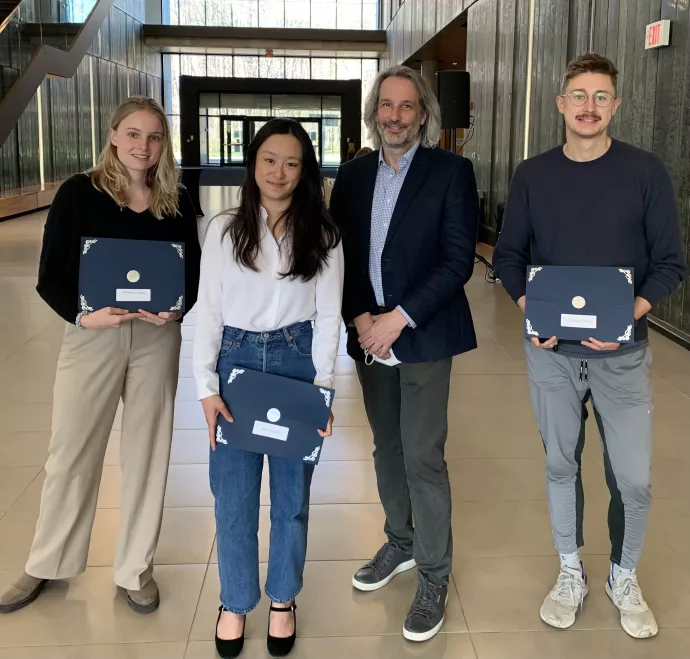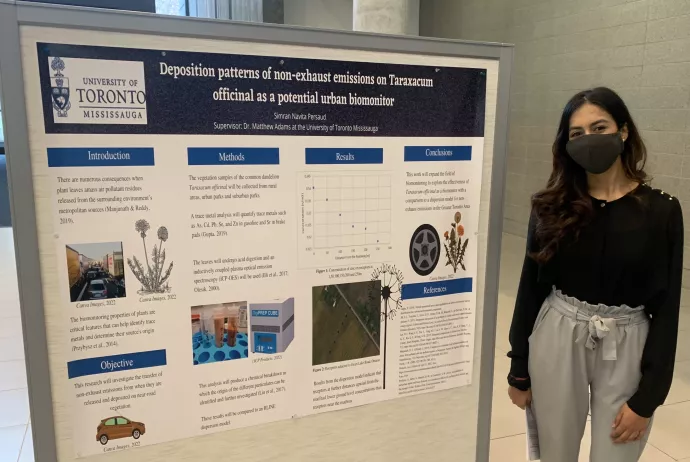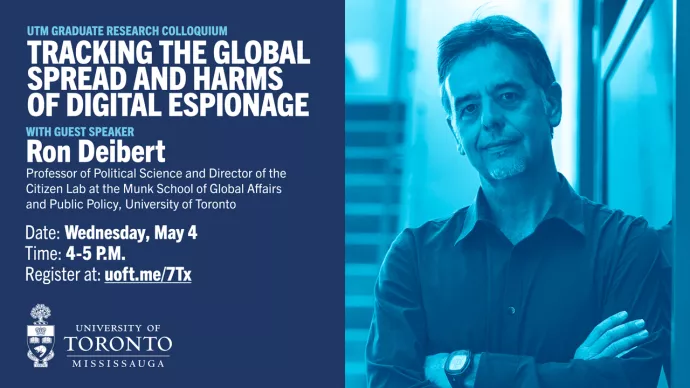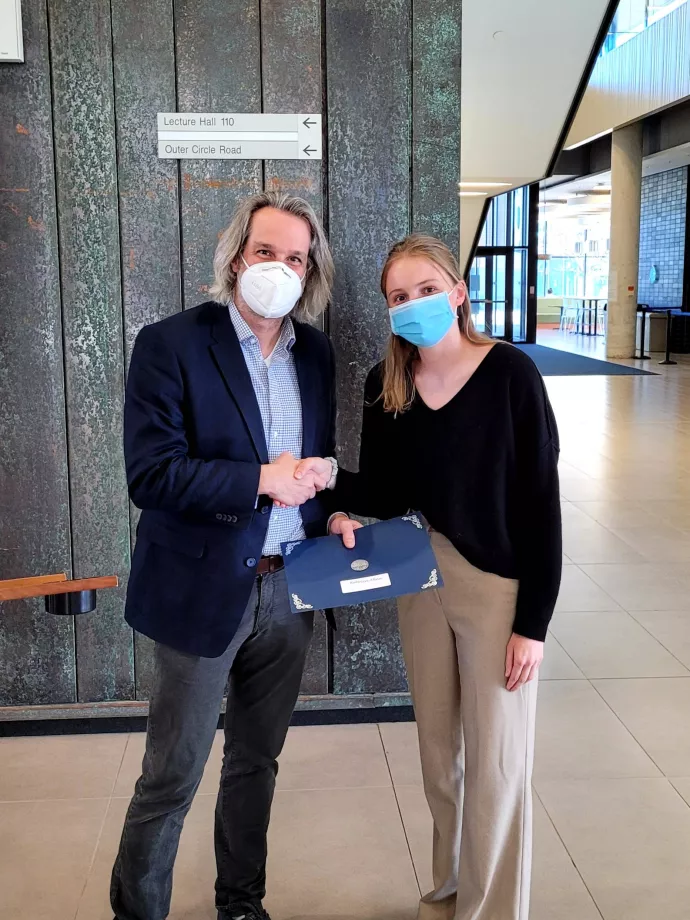
2022 Graduate Research Colloquium at UTM

Graduate student Simran Navita Persaud (pictured left) has undertaken a study to consider Taraxacum officinale, more commonly known as dandelions, as key collectors of important data related to pollution.
Her project “Deposition patterns of non-exhaust emissions on Taraxacum officinale as a potential urban biomonitor,” was one of the posters featured as part of the celebration at UTM’s Graduate Research Colloquium on May 3.
“We are using dandelions to understand where vehicles' trace metals, which are often toxic, may end up in our ecosystems,” says Persaud, who is conducting this work within the lab of Professor Matthew Adams in the Department of Geography, Geomatics, and Environment.
"I am interested in dandelions that are further from major roadways, which likely have lower concentrations of deposited trace metals on the foliage, and I will collect the samples in a particular timeframe – between 11 am and 1 pm – in order to minimize the influence of peak driving times. Once I have these samples, we will compare the amount of trace metals on the leaves from previous experimental tests and also estimates from a dispersion model.”
This is just a sampling of the compelling projects that graduate students and postdocs are undertaking in their studies at UTM.
Over the course of two days, May 3 and 4, 2022, there were several inspired poster and oral presentations that covered a series of topics, everything from the impact of hormones on the “medically important insect Rhodnius prolixus” (poster by Areej Al-Dailami in the lab of Professor Angela Lange from Biology) to continuum robotics and the tendons that drive them (oral presentation by Sven Lilge in the lab of Professor Jessica Burgner-Kahrs in Mathematical & Computational Sciences).

His talk, “Tracking the Global Harms and Spread of Digital Espionage,” was a deep dive into current trends in the abuse of spyware, and the ways in which opportunities to infiltrate our mobile devices and social media platforms has become increasingly sophisticated and devious, including “zero-click attacks” that require no action from the victim who could be the savviest of users when it comes to technology.
“Political struggles in and through the global Internet and related technologies are entering into a particularly dangerous phase for openness, security, and human rights,” said Deibert.
“In addition, powerful spyware tools, such as Pegasus, have been used to infiltrate civil society networks, targeting the devices of journalists, human rights defenders, minority movements, and political opposition, often with lethal consequences.”
In his talk, Deibert provided several recent examples of notable victims of these attacks and how they unfolded, including human rights defender Ahmed Mansoor in the United Arab Emirates, as well as murdered journalist Jamal Khashoggi, who was collaborating with Canadian Omar Abdulaziz and Saudi dissident Ghanem Almasarir around social media activism.
Deibert also offered some strategies to reduce the possibilities of these attacks, such as investigating, documenting, and lobbying for more government oversight.
“It won’t solve the problem, but it will help mitigate some of the harms,” said Deibert.
See the Citizen Lab’s Security Planner for more information.
The colloquium, an annual event that is co-hosted by UTM’s Office of the Vice-Principal Academic and Dean, the UTM Library, and UTM’s Association of Graduate Students (UTMAGS), culminated with an award presentation presided by Professor Bryan Stewart, UTM’s vice-dean, graduate studies and postdoctoral affairs.
At this concluding ceremony, the award for best poster was presented to Eugene Klyshko from the Department of Chemical and Physical Sciences (Professor Sarah Rauscher’s lab) for his project, “LAWS: Local Alignment for Water Sites --- a method to analyze crystallographic water in simulations,” and best oral presentation prize was awarded to Shu Hong Shi from the Department of Geography, Geomatics and Environment for her talk, “Seasonal Variation of Ecosystem Metabolism and Limnology in Temperate Ponds” (lab of Professor Igor Lehnherr).
Other awards were also presented at the event.
The UTM Graduate Student Research Award was presented (in absentia) to PhD candidate Rebecca Horne from the Department of Psychology in the lab of Professor Emily Impett. Horne was recognized for her excptional contributions to her field, which is at the intersection of gender studies, psychology, and family science, her incredible publication record and funding acheivements, and for being, as one referee put it, "the best graduate student we ever had." (Read more about Horne's work when she was awarded the Vanier Canada Graduate Scholarship in 2018 and profiled in "Scholarly Success.")

“Every year I am profoundly impressed by the range of talent, brilliance, and enthusiasm by the contingent of bright graduate students and postdocs at UTM,” said Stewart.
“This level of engagement and the inspiring research programs you have all fostered, despite some of the challenges you have faced over the past couple of years, is truly incredible to witness. We are all so proud of your achievements and the meaningful contributions and impact you continue to make in the UTM and academic communities and beyond.”
The full list of poster presentations on May 3rd included the following:
Department of Biology
- Areej Al-Dailami, “Exploring the Role of the Glycoprotein Hormone GPA2/GPB5 in the Medically Important Insect, Rhodnius prolixus”
- Samiha Benrabaa, “Ecdysteroid-signaling and reproduction in Rhodnius prolixus, a vector of Chagas disease”
- Luca Finetti, “Octopamine and tyramine receptors in the Dengue vector Aedes aegypti”
- Oscar F. Nunez-Martinez, “Intact nuclei isolation protocol to investigate the reproductive chromatin landscape in Populus”
- Ilapreet Toor, “Hormones do not make the mole-rat: no steroid hormone signatures of subordinate behavioral phenotypes”
Department of Chemical & Physical Sciences
- Diaa Abdallah, “Developing a first-generation selective HDAC3 inhibitor for treatment of aggressive blood cancers”
- Rebecca Allan, “First-in-class DNAJ-PRKACA Inhibitors for the Treatment of Fibrolamellar Hepatocellular Carcinoma”
- Advikaa Dosajh, “Development of an Impedance Bioresistor for COVID-19 Prognosis”
- Liam Haas-Neill, “Mutant Cancer Protein STAT5b Has Two Distinct Conformations”
- David Hrovat, “Rational Design of Phosphonate Ligands for Upconverting Nanoparticles in Biological Applications”
- Eugene Klyshko, “LAWS: Local Alignment for Water Sites --- a method to analyze crystallographic water in simulations”
- Johnathan Afheldt Sorrentino, “Visualization of Bacteria-Mediated Mineral Precipitation Surrounding Decaying Crickets Acheta domesticus”
- Justin Sung-Ho Kim, “Conformational Changes of Proteins Induced by Electric Fields in Crystal Simulations”
Department of Geography, Geomatics and Environment
- Laura Alvarez Salinas, “Conductive Heat Flow Through Temperate Region Lake Ice”
- Simran Persaud, “Deposition patterns of non-exhaust emissions on Taraxacum officinale as a potential urban biomonitor”
The full list of oral presentations on May 4th included the following:
Department of Chemical & Physical Sciences
- Harsimran Kaur Garcha, “Hijacking the Cell’s Degradation Machinery to Treat Cancer”
- Spencer Smyth, “Force Without Form: Delineating a Disordered Protein Complex with Single-Molecule Fluorescence Spectroscopy”
Department of Geography, Geomatics and Environment
- Shu Hong Shi, “Seasonal Variation of Ecosystem Metabolism and Limnology in Temperate Ponds”
Department of Management
- Odilia Yim, “Not Asian American: Preferred Self-labelling Practices of Chinese immigrants
Department of Mathematical & Computational Sciences
- Sven Lilge, “Tendon Driven Parallel Continuum Robots”
Institute of Communication, Culture, Information and Technology
- Steven Logan, “Homework: Locked Down in the Electronic Cottage with Alvin Toffler”
